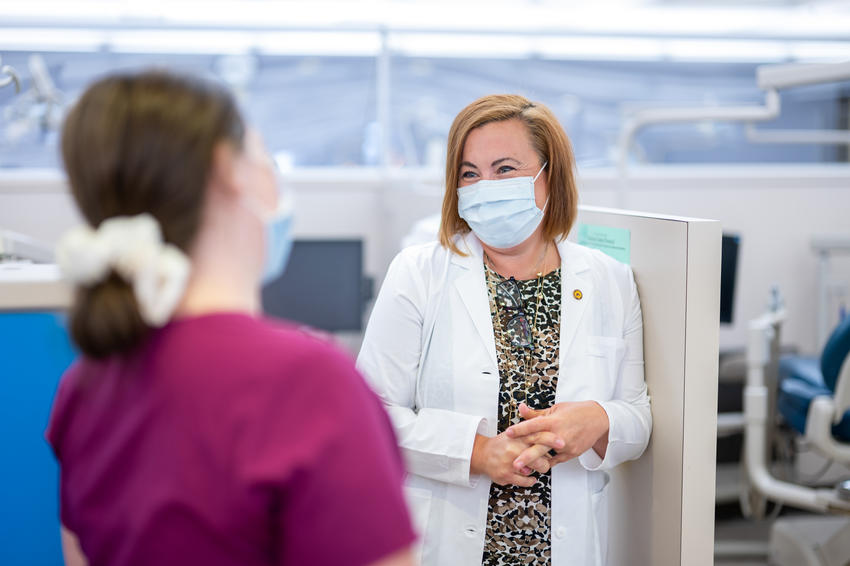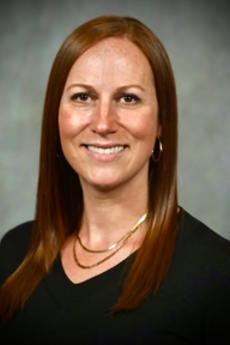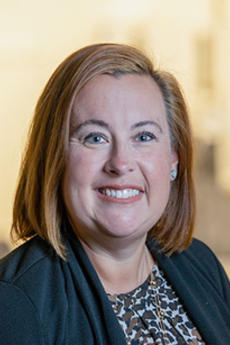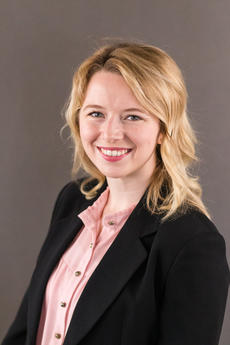Dental hygiene learners explore their passions through research

Faculty in the Dental Hygiene program at the School of Dentistry are fostering research among their students—and it’s paying off.
In the past four years, Michelle Arnett, RDH, MS, assistant professor of dental hygiene, and Yvette Reibel, EdD, RDH, clinic director in the Division of Dental Hygiene, have mentored four BSDH learners and one MDT learner through the research process. Five of those learners have published their research—three alone in February 2023.
Arnett and Reibel are both passionate about the role of research in the profession. “Research is required to advance the profession with innovative ways to practice clinical dental hygiene, improve patient outcomes and enhance our teaching methodology to develop the next generation of clinicians, educators and researchers,” said Arnett.
Reibel agrees. “Research is essential for the field of dental hygiene to explore new strategies, understand the clinical significance of emerging conditions and develop an evidence-based curriculum,” she said.
Because of this understanding of the value of research, the program has partnered with Writing Across the Curriculum at the University of Minnesota to provide writing experiences for learners. This includes the University of Minnesota Dental Hygiene Writing Award, which provides a fourth-year student the opportunity to submit a literature review. Each year’s winner works with Reibel and Arnett to develop a research question and conduct research based on the review, with the goal of submission for the American Dental Hygienists’ Association’s Sigma Phi Alpha journalism award and subsequent publication in a peer-reviewed journal.
One student successfully won the Sigma Phi Alpha award, and five have published their research. Projects have included the exploration of attitudes toward treating transgender patients, caring for patients with renal disease and more.
Breanna Clark, BSDH ’21, chose to explore the attitudes and knowledge of dental hygienists toward patients with a background of domestic violence. Clark won the University of Minnesota Dental Hygiene Writing Award during her senior year, and her paper was published in the Journal of Dental Hygiene in February 2023.
Clark, who never anticipated an interest in research, found that studying a question she was passionate about made all the difference. “I wanted to bring a lot of awareness to the fact that we see patients, but we don’t see every side of them,” she said. “I want to encourage dental hygienists to have conversations with their patients and know how to support them when they need it.”
The publication process has made Clark, who now works in private practice, a better clinician. “It gave me more confidence, and it’s also helped me see how much goes into research,” she explained. “I try to keep up-to-date on new research, and this helps me understand how legitimate the peer-reviewed research I’m reading really is.”
Clark’s experience is exactly what Reibel and Arnett are hoping for in their students. “These projects support individual students and their research interests,” Arnett said. “Students have good ideas! It allows students to investigate populations or gaps in the knowledge to broaden their skill set.”
And this ability to foster student-led research leads to interesting questions that might not otherwise see the light of day. “Our students have an ability to think outside the box,” said Reibel. “They often view gaps in dental hygiene and clinical practice from a different perspective, and have pointed out gaps that may have been overlooked for years.”
Reibel, Arnett and the students put in hours of effort beyond program requirements to make these publications happen—but it’s worth it, thanks to their love for the profession and their passion for making it as excellent as it can be.
“We do this work because we are passionate about supporting our students and the program,” said Arnett.
“It is our responsibility to allow students to explore all career pathways available to them after graduation,” said Reibel. “The mentorship and collaboration on additional research projects allows students to experience research and writing, which breaks down barriers they may have about the ability to do such work. The dedication and enthusiasm that we have experienced in the last few years makes me excited to see what significant impacts they will make on our profession—whether they continue to explore research professionally or not.”


